The Nursing Home Law Center is committed to providing the legal resources necessary to hold negligent facilities accountable.
Nashville Nursing Home Abuse Lawyer

Licensed in Tennessee
Elder abuse is a deeply troubling issue that affects vulnerable Nashville residents. The effects of such abuse in nursing homes can be devastating, leading to serious injuries, emotional trauma, and even the victim’s death.
If your loved one has suffered abuse or neglect in a long-term care facility, it is crucial to act swiftly. Contact an experienced Nashville nursing home abuse lawyer to help protect their rights, stop the abuse, and seek compensation for their suffering.
Nashville Nursing Home Abuse Settlements We’ve Won for Clients
$12,800,000 – abuse verdict in the Nashville area involving untreated bed sores that led to a tragic death.
$3,000,000 – Pressure sore wrongful death settlement for a woman whose husband was admitted to a skilled nursing home near Nashville following hip replacement surgery.
$2,333,000 – Settlement for two women in a Nashville-area nursing home who a CNA sexually assaulted.
$2,150,000 – Wrongful death settlement involving facility-acquired bed sores and sepsis at a nursing home in the Nashville region.
Why Hire Nursing Home Law Center?

Our lawyers are committed to securing justice for those impacted by nursing home neglect and abuse. We have successfully handled thousands of cases and obtained significant settlements for families of nursing home patients.
Our attorneys conduct thorough investigations, gathering crucial evidence to prove neglect and abuse. Whether your loved one has fallen victim to physical, sexual, financial, or emotional abuse, we fight aggressively to hold negligent caretakers accountable.
Speak with one of our experienced personal injury lawyers today to explore your legal options.
Types of Abuse Cases Our Nashville Nursing Home Lawyers Handle

Abuse in nursing homes takes many forms, all of which violate federal and state laws. Our Nashville lawyers handle many case types, including:
Physical Abuse
Physical abuse in nursing homes includes acts such as hitting, slapping, pushing, kicking, or improper use of restraints. These actions can result in severe injuries and lasting trauma.
Sexual Abuse
Sexual abuse occurs when an employee or another individual forces or coerces a nursing home resident into any non-consensual sexual interaction. This includes inappropriate touching, harassment, sexual assault, or forcing residents to witness inappropriate acts.
Emotional Abuse
Emotional abuse involves verbal threats, humiliation, intimidation, or isolation by staff members. This type of abuse can cause significant psychological distress, leading to depression, anxiety, and emotional withdrawal.
Financial Abuse
Financial abuse occurs when staff misuse or steal a patient’s funds, property, or benefits. It can include unauthorized withdrawals, forged signatures, or manipulation of financial documents.
Neglect
Neglect occurs when nursing facilities fail to provide residents with necessities such as food, hydration, hygiene, or medical care. Neglect can lead to severe health complications, including injuries, malnutrition, dehydration, and life-threatening conditions.
If your loved one has suffered abuse in a nursing home, our Nashville attorneys are ready to fight for the compensation you and your family deserve.
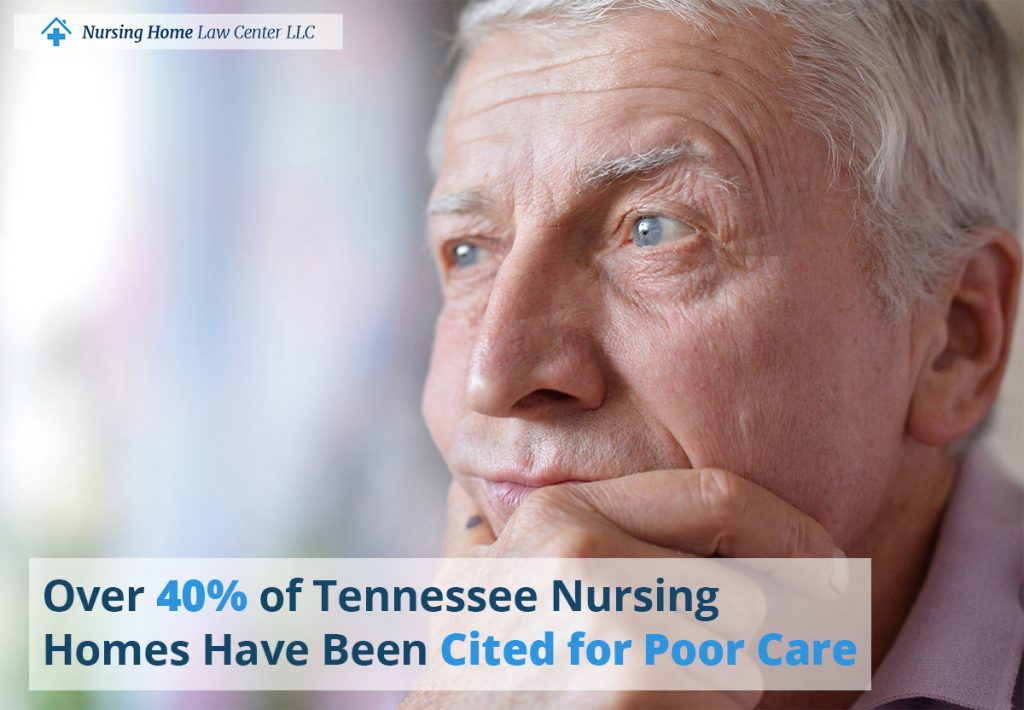
Understanding Your Legal Rights in Nashville Nursing Homes
Residents of nursing homes are entitled to protections under federal and state laws. The Nursing Home Reform Act of 1987 establishes national standards for long-term care facilities, ensuring that every person receives quality care.
Additionally, the Tennessee Department of Health regulates nursing home facilities, overseeing licensing and investigating complaints related to improper care. Under TN law, residents are protected from physical abuse, sexual abuse, financial abuse, and emotional abuse.
Who Can File a Nursing Home Abuse Claim?
Several parties may have the legal right to file a claim in Tennessee, including:
- The Victim – If the nursing home resident is mentally competent, they can file a claim on their behalf.
- Family Members or Legal Guardians – If a suffering patient is incapacitated or unable to advocate for themselves, immediate family or a legally appointed guardian can initiate legal action.
- Wrongful Death Lawsuits – If nursing home abuse results in the death of a loved one, surviving family members can file a wrongful death claim to seek justice and compensation.
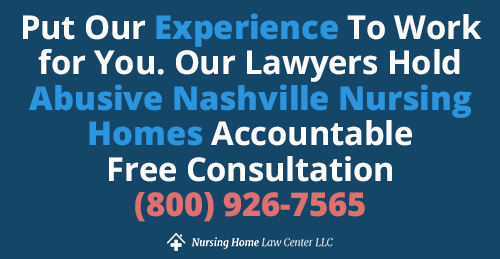
How Long Do You Have To File?
In Nashville and throughout the state, state law governs who can bring a claim forward. According to Tennessee Code Ann. § 20-5-106, wrongful death claims must be filed by the closest surviving relative, typically a spouse, child, or parent. Additionally, Tennessee elder abuse laws (Tenn. Code Ann. § 71-6-102) provide protections for elderly and dependent adults, ensuring they have legal recourse if they have suffered abuse in a nursing home.
How Our Nashville Nursing Home Abuse Lawyers Can Help You
Our experienced nursing home abuse attorneys in Nashville provide comprehensive representation, ensuring that those who’ve suffered abuse and their families receive justice. Our legal team is committed to fighting for your rights, holding negligent facilities accountable, and securing the compensation you deserve.
We take a strategic and thorough approach to every case, including:
- Investigating claims by reviewing medical records, facility inspection reports, and incident documentation to uncover patterns of neglect or mistreatment.
- Gathering critical evidence such as witness statements, video surveillance, and expert testimony to establish liability and prove the extent of injuries.
- Negotiating settlements with insurance companies to ensure victims receive fair compensation for medical expenses, emotional trauma, and other damages.
- Taking cases to trial when necessary, leveraging our litigation experience to present a strong case before a jury and seek maximum justice for those harmed by nursing home abuse.
Our dedicated attorneys are here to help. Contact us today to learn more about your legal options.
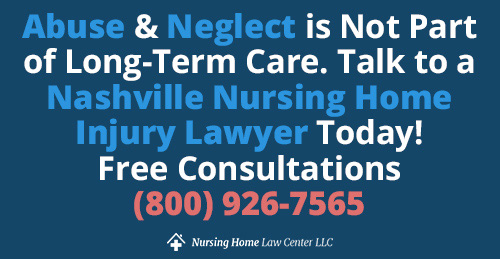
Common Signs of Nursing Home Abuse in Nashville
Of 37 Medicare-certified Nashville nursing homes, 22 (59.5%) have below-average ratings. Recognizing signs of nursing home abuse is crucial:
- Unexplained bruises or fractures.
- Bedsores (pressure ulcers) and infections.
- Weight loss and signs of malnutrition.
- Withdrawal or sudden behavior changes.
- Fear or anxiety around staff members.
- Unsanitary living conditions.
- Unexplained financial transactions.
Poorly Rated Nursing Homes in Nashville
- AHC Cumberland
- Hillcrest Healthcare Center
- Smyrna Care Center
- Stoneridge Health Care, LLC
If your loved one is showing signs of nursing home abuse or is suffering, seek legal help immediately.
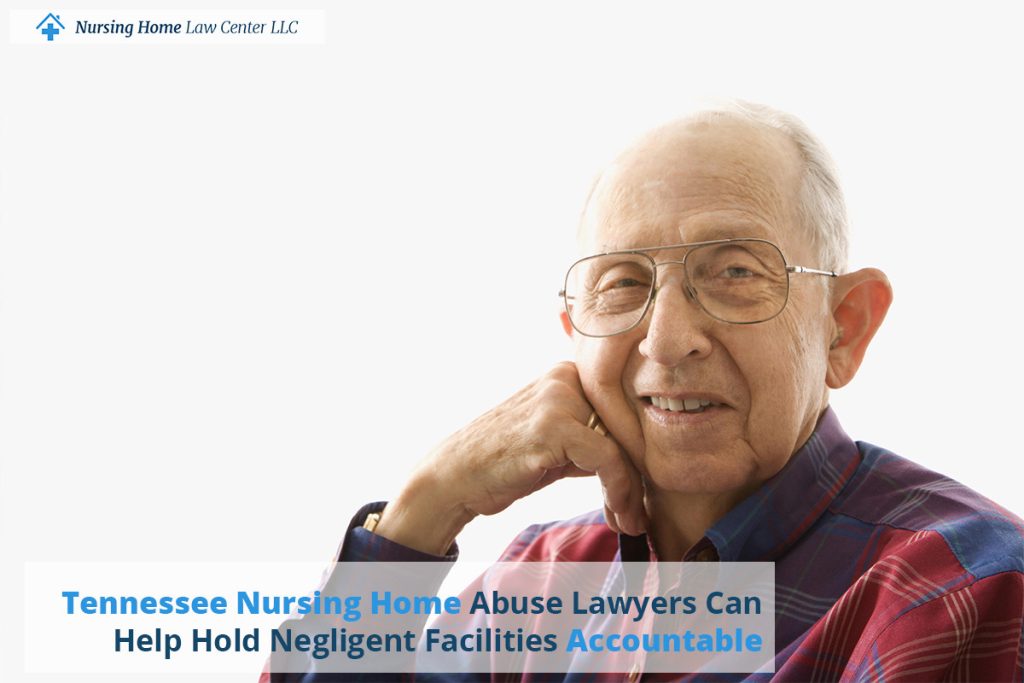
What to Do If You Suspect Nursing Home Abuse in Nashville
If you believe a facilities staff is harming your loved one, take these steps immediately:
- Call 911 if the victim is in immediate danger.
- Report abuse to the nursing home administrator and demand an investigation.
- Contact the Tennessee Ombudsman Program to advocate for resident rights.
- Consult an experienced Nashville nursing home abuse lawyer to file a claim and seek justice.
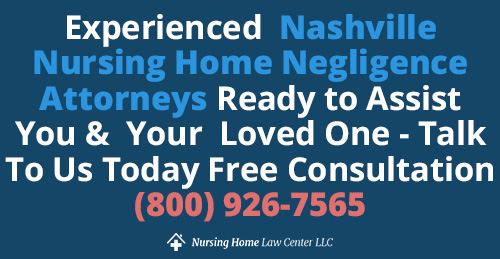
Contact a Nashville Nursing Home Abuse Lawyer Today
At Nursing Home Law Center, our dedicated Tennessee nursing home abuse lawyers are committed to protecting residents’ rights and ensuring they receive the care and dignity they deserve.
Request A Free Case Evaluation
If your loved one has suffered abuse or neglect, we are here to help. Our personal injury law firm has a proven track record of successfully handling elder abuse claims in Nashville. Call us at (800) 926-7565 or complete our contact form.
Our team is familiar with Nashville’s great neighborhoods and the unique challenges families face when placing their loved ones in nursing facilities. If your family member has been harmed at a nursing home in the greater Nashville area, contact one of our local nursing home abuse lawyers today. We serve Davidson, Williamson, and Rutherford counties.

